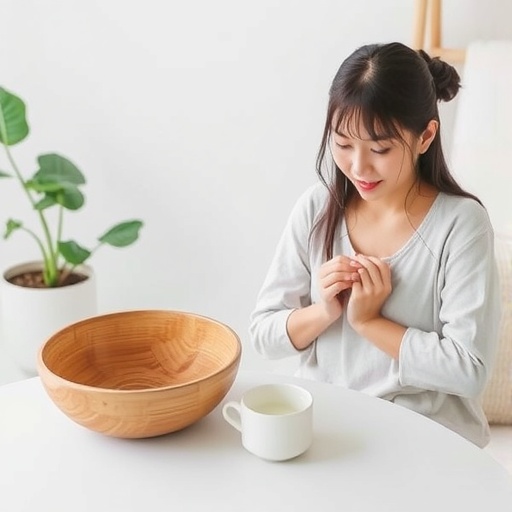In recent years, there has been a notable resurgence of interest in traditional forms of medicine, particularly within the realm of complementary therapies. Among these is Hyunburikyung-tang, a traditional Korean medicine that has been utilized for various ailments, including dysmenorrhea. A groundbreaking study led by Jo, Sy. et al., published in “BMC Complementary Medicine and Therapies,” dives deep into the genotoxicity and acute toxicity of this herbal formulation, shedding light on the implications of its use in modern medical practices.
The study, which is anticipated to pave the way for more comprehensive understanding and acceptance of traditional treatments in contemporary medicine, evaluates the safety profile of Hyunburikyung-tang. As alternative therapies gain traction, understanding their genetic impact and toxicity becomes essential. Jo and colleagues conducted a rigorous investigation to assess the potential risks associated with this herbal medicine.
Dysmenorrhea, or painful menstruation, significantly affects the quality of life for many individuals. Traditional Korean medicine, among other holistic practices, often proposes herbal formulations such as Hyunburikyung-tang to alleviate this distressing condition. However, concerns surrounding the safety and efficacy of such treatments persist, necessitating scholarly attention. The research emerges at a critical junction where traditional practices are being scrutinized through modern scientific methodologies.
The study’s methodology involved a series of in vitro and in vivo experiments designed to evaluate both genotoxic and acute toxic effects. By rigorously applying scientific processes, the researchers aimed to provide an evidence-based perspective on the traditional remedy’s safety. Such an approach is especially vital as it bridges the gap between ancient practices and contemporary medical standards, potentially enhancing patient care through informed decision-making.
One of the primary findings from the researchers is the lack of significant genotoxic effects associated with Hyunburikyung-tang. This is particularly encouraging for practitioners who aspire to integrate these traditional remedies into their repertoire. Genotoxicity is a critical concern when prescribing any medicinal formulation, as it relates directly to the potential for damaging an individual’s DNA.
Additionally, the acute toxicity results demonstrated a favorable safety profile, reinforcing the legitimacy of further clinical investigations. Acute toxicity refers to the adverse effects that occur shortly after a single dose of a substance. Understanding this aspect allows for a more nuanced perspective on the short-term risks involved in using Hyunburikyung-tang. Such data is imperative not only for healthcare providers but also for patients who are looking for safe alternatives to manage their symptoms.
While the study presents preliminary evidence supporting Hyunburikyung-tang as a safe option for treating dysmenorrhea, it also urges a cautious approach. The authors emphasize the need for larger clinical trials to substantiate these findings further. Medical practitioners are encouraged to remain grounded in scientific evidence, especially when dealing with herbal medicines, which might have varying effects on different individuals.
In the context of traditional medicine, the significance of culturally accepted remedies cannot be understated. Hyunburikyung-tang symbolizes a reservoir of historical knowledge that can coexist with modern scientific inquiry. As the research community delves deeper into these ancient practices, the potential to validate and incorporate them into mainstream medicine grows exponentially. This study exemplifies how such integrations can be achieved while maintaining rigorous safety standards.
Furthermore, the continued pursuit of knowledge in this field can lead to the discovery of new therapeutic agents. The active compounds within Hyunburikyung-tang may hold untapped potential that could be isolated and synthesized for broader clinical applications. This not only aligns with the global trend of exploring natural products for medicinal purposes but also allows for a harmonious blend of tradition and innovation.
The research by Jo et al. has garnered attention beyond the immediate field of herbal medicine. It ignites discussions among various stakeholders, including healthcare professionals, educators, and policy-makers on the importance of evidence-based practices in traditional medicine. The integration of rigorous scientific methodologies into the evaluation of these healing practices can foster trust and openness in their adoption.
Ultimately, the advancement of traditional remedies like Hyunburikyung-tang rests on continuous research and dialogue, promoting a culture of safety and enhancement in patient care. By facilitating a convergence of traditional wisdom and modern science, the medical community can better serve diverse populations in need of effective and safe treatment options.
As this study unfolds, it will be vital for future research to address the gaps identified regarding long-term usage and the diverse population that utilizes Hyunburikyung-tang. The call for increased investigation is not just a suggestion but rather an essential step towards ensuring holistic care that reflects the needs and safety of all patients.
In conclusion, the findings presented in this research significantly contribute to the broader dialogue surrounding traditional medicine and its place in contemporary healthcare. By evaluating the safety of Hyunburikyung-tang, Jo et al. provide a crucial stepping stone toward embracing a more integrative approach to treating conditions like dysmenorrhea. This study stands to inspire further scientific inquiries into other traditional remedies, ultimately ensuring they are prescribed with confidence and backed by empirical evidence.
Subject of Research: Evaluation of Genotoxicity and Acute Toxicity of Hyunburikyung-tang
Article Title: Genotoxicity and acute toxicity of Hyunburikyung-tang: assessing the safety of prescribing traditional Korean medicine for dysmenorrhea
Article References:
Jo, Sy., hwang, Sm., Kim, Js. et al. Genotoxicity and acute toxicity of Hyunburikyung-tang: assessing the safety of prescribing traditional Korean medicine for dysmenorrhea.
BMC Complement Med Ther 25, 372 (2025). https://doi.org/10.1186/s12906-025-05127-y
Image Credits: AI Generated
DOI: 10.1186/s12906-025-05127-y
Keywords: Hyunburikyung-tang, genotoxicity, acute toxicity, traditional Korean medicine, dysmenorrhea.





